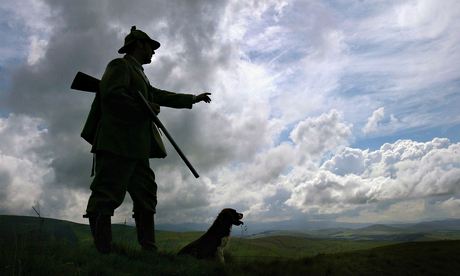The scoured, scorched Highlands could be brought to life – maybe an independent nation will have the courage to act

‘It is astonishing, in the 21st century, that people are still allowed to burn mountainsides for any purpose, let alone blasting highland chickens out of the air.' Photograph: Christopher Furlong/Getty
Power's ability to resist change: this is the story of our times. Morally bankrupt, discredited, widely loathed? No problem: whether it's neoliberal economics, tax avoidance, coal burning, farm subsidies or the House of Lords, somehow the crooked system creeps along.
Legally, feudalism in Scotland ended in 2004. In itself, this is an arresting fact. But almost nothing has changed. After 15 years of devolution the nation with the rich world's greatest concentration of land ownership remains as inequitable as ever.
The culture of deference that afflicts the British countryside is nowhere stronger than in the Highlands. Hardly anyone dares challenge the aristocrats, oligarchs, bankers and sheikhs who own so much of this nation, for fear of consequences real or imagined. The Scottish government makes grand statements about land reform, then kisses the baronial boot. The huge estates remain untaxed and scarcely regulated.
You begin to grasp the problem when you try to discover who owns them. Fifty per cent of the private land in Scotland is in the hands of 432 people – but who are they? Many large estates are registered in the names of made-up companies in the Caribbean. When the Scottish minister Fergus Ewing was challenged on this issue, he claimed that obliging landowners to register their estates in countries that aren't tax havens would risk "a negative effect on investment". William Wallace rides again.
Scotland's deer-stalking estates and grouse moors, though they are not agricultural land, benefit from the outrageous advantages that farmers enjoy. They are exempt from capital gains tax, inheritance tax and business rates. Landowners seek to justify their grip on the UK by rebranding themselves as business owners. The Country Landowners' Association has renamed itself the Country Land and Business Association. So why do they not pay business rates on their land? As Andy Wightman, author of The Poor Had No Lawyers, argues, these tax exemptions inflate the cost of land, making it impossible for communities to buy.
Though the estates pay next to nothing to the exchequer, and though they practise little that resembles farming, they receive millions in farm subsidies. The new basic payments system the Scottish government is introducing could worsen this injustice. Wightman calculates that the ruler of Dubai could receive £439,000 for the estate in Wester Ross he owns; the Duke of Westminster could find himself enriched by £764,000 a year; and the Duke of Roxburgh by £950,000.
With the help of legislators and taxpayers, the owners of the big estates are ripping apart the fabric of the nation. The hills in many parts look as if they have been camouflaged against military attack, as they have been burned in patches for grouse shooting. It is astonishing, in the 21st century, that people are still allowed to burn mountainsides – destroying their vegetation, roasting their wildlife, vaporising their carbon, creating a telluric eczema of sepia and grey blotches – for any purpose, let alone blasting highland chickens out of the air. Where the hills aren't burnt for grouse they are grazed to the roots by overstocked deer, maintained at vast densities to give the bankers waddling over the moors in tweed pantaloons a chance of shooting one.
Hanging over the nation is the shadow of Balmoral, whose extreme and destructive management – clearing, burning, overgrazing – overseen by Prince Philip, president emeritus of the World Wide Fund for Nature, is mimicked by the other landowners. Little has changed there since Victoria and Albert adopted an ersatz version of the clothes and customs of the people who had just been cleared from the land. This balmorality is equivalent to Marie Antoinette dressing up as a milkmaid while the people of France starved; but such is Britain's culture of deference that we fail to see it. Today they mix the tartans with the fancy dress of Edwardian squires, harking back to the last time Britain was this unequal.
But despite this lockdown, there is, if not quite a Highland spring, the beginnings of something different: on one side of me, here in Boat of Garten, is the bare, black misery of the Monadhliath mountains; on the other, the great rewilding that is quickly but quietly spreading through the north-west of the Cairngorms national park. Across 100,000 hectares, the RSPB, the Forestry Commission, the National Trust and Wildland Ltd (owned by the Danish textiles billionaire Anders Holch Povlsen) are seeking to reverse the destruction, reduce the deer to reasonable numbers, and get trees back on the braes. On Povlson's estates the area of woodland has doubled (to 1,400 hectares, or 3,450 acres) since 2006, solely through the control of deer. It's not land reform, but it's the best that can be done with the current, dire model of Scottish ownership.
The forests at the moment are bright with birdsong. In some places, looking down on lochans surrounded by marshes and regenerating pines, you almost expect to see a moose emerging from the trees. Trees are racing up the denuded hillsides: in Glenmore I've come across young pines, birch and rowan growing at 800 metres. Already people are talking about reintroducing lynx here within 20 years.
As the return of the ospreys to the lakes and forests in this part of the park shows, the potential for ecotourism, which spreads income and employment through the economy, is vast. The contrast with the scorched and scoured grouse moors of the east side of the national park, which employ hardly anyone, concentrate wealth in tax havens and are unmysteriously devoid of most birds of prey, could not be greater.
It doesn't reverse the other injustices, but it begins to undo the centuries of physical destruction. I would vote yes in September if I lived here, on the grounds that it presents an opportunity to do something new, and I furiously hope, despite the evidence, that an independent Scottish government will take it.
It should list all the beneficial owners of the land; impose the taxes Westminster refuses to levy; ensure that only farmers get subsidies and cap them at £30,000 a head; ban burning; control deer numbers; and turn Scotland into a land where you can actually see green shoots of recovery. On Friday the Land Reform Review Group, set up by the government at Holyrood, will publish its report, and it's likely to be devastating. Will Scotland get off its knees at last?




